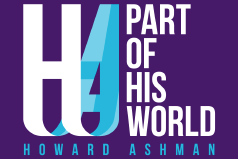Adolescent Magic
As we both moved into adolescence and Howard found his place at Children’s Theater Association and at other local theaters, I lost my brother’s attention. He made new friends and began to feel his way out of the house and into the larger world. His new friends tended to be older than he was (partly because he’d skipped a grade in school) and to me, intimidating. When he was home, we fought and bickered like, well, brother and sister. Something we had avoided when we were younger. Howard taunted me in song,
“I won’t dance, please ask me.”
He angered me to incoherence. Angered me and made me laugh at the same time. Which only angered me more.
We still had our moments, whispering about Mom and Dad and our grandparents. Analyzing them, we parsed the personalities of the adults in our family as if they were difficult sentences waiting for the logic of grammar to release their mysteries. We made up stories about them, whispered secrets, looked for reasons and answers that were beyond our understanding.
And the stories we created were often funny. Howard brought out my creativity – just trying to keep up with him and reach the golden grail of getting a laugh – was work. His impressions of Nana and Aunt Ann and Pop Pop were cruel and funny and right on target. We were both pretty good at imitating Mom singing Summertime. Though, looking like her, I had a definite edge.
We didn’t imitate Dad. He was too much of an idol and we were both too afraid of his death, for that. Instead, we romanticized him – his hardscrabble youth and tough guy attitude. His Walter Mattheau looks and Willy Loman sadness and his genius at getting a laugh.
When Howard was fifteen and I was twelve, our parents had bought a house with our grandparents. It was a stunningly bad idea. Our grandparents, Nana and Pop Pop, were overwhelming in their need for attention and, more importantly, proof of affection. We all understood that without them we could never have afforded to live in the new house. And the price we paid was their overwhelming presence.
We had moved up from a row house to a house that stood on its own. But though we no longer lived in a house that shared walls with strangers, in this new house with family, we lost our privacy and maybe our center as well.
Nana and Pop Pop got the master bedroom, relegating Mom and Dad to something like childhood status again. Howard’s room was next to the clubroom – his high windows, just above ground level, suitable for a quick climb out of the house and into the cars of his older friends.
When Howard was home, he’d disappear downstairs and I’d only occasionally get to see him. Among so many other things I’d lost in those teen age years, I felt the loss of my brother most deeply. One day, I remember sitting in his room, flipping through a paperback,
“Can I read this?” I asked.
Howard looked at it…
“No,” he said. “Not yet. Try this instead.” He handed me a copy of The Once and Future King.
Every now and then, the brother I remembered – the one who could make magic happen – would reemerge. We were both great fans of Judy Collins. Her album Wildflowers had just come out and she would be playing at a small club in DC. Howard and a crowd of his friends were going. Unexpectedly, miraculously, Howard said I could come along.
It was a small club with round tables and candles melting in Chianti bottles. It was smoky from cigarettes and loud with too many voices trying to be heard.
I drank soda and kept my mouth shut while Howard and his friends talked and were fabulous and amusing. When Collins walked on stage, with her guitar and those blue eyes, the room quieted. Our table was on the edge of the stage – how did Howard get those great seats? I never asked.
But it hardly mattered, really, how he did it. It was all part of the magic I believed in. The magic only Howard could make.
